Eurasia-Chess chessmen set for Chess-XiangQi-Shogi & Variants
External image links detected!
You know what would look worse on your page than this big, ugly warning? Broken image links. If you're the author, please make sure that doesn't happen to this page by replacing the following external graphic images with local copies.
Array
(
[6] => http://www.eurasia-chess.com/Chaturanga-Chaturaji.gif
)

    Cannon,      Elephant   &      SilverÂ
You'll find hereafter photos of a new bicolor wooden chessmen set "Eurasia-Chess" (commercial handcrafted product currently on small-serie production process), enabling - for the very first time - the play of the 3 main kind of Chess (European, Chinese and Japanese),
- using new chessmen pieces (Cannon,
Elephant & Silver General), in complement to regular
chessmen set, and
- allowing piece promotion and
piece capture&drop
 European Chess (Orthodox) |
 XiangQi (Chinese Chess) |
 Shogi (Japanese Chess) |
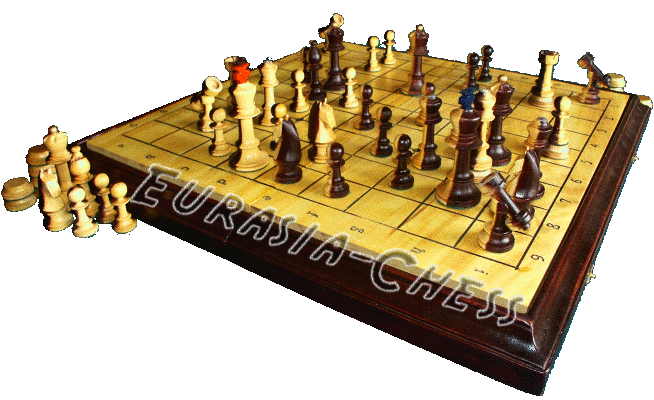
- Historical Chess variants, such as Chaturanga (for 2, 3 or 4 players), Sho-Shogi (with a drunk elephant) ...
- or even recent Shogi-drop-like Chess/XiangQi variants, such as Chessgi, CrazyHouse, Drop-XiangQi ... and many other Chess variants ...
 Chaturaji (4-handed Chaturanga)
: Initial setup
Highly strategic and agressive game to be played with 2, 3 or 4 players |
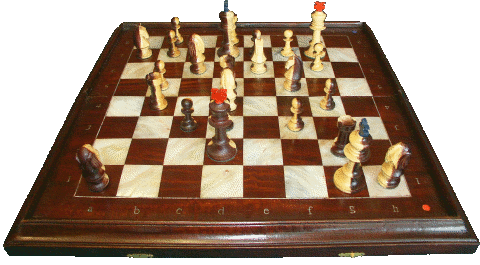 Well ! That's not that easy
to recognize the camp of a piece...
but this is playable and enjoyable, even if 4 differents colors would be easier. (Black&White team against Bicolor team) |
Pieces
Chessmen are Asian Staunton-like shape, of recommended FIDE-dimensions (size 5).There's 48 Chessmen (2 Kings, 4 Queens, 4 Bishops, 4 Elephants, 4 Silvers, 4 kNights, 4 Rooks, 4 Cannons, 18 Pawns), and 16 Discs :
 |
 |
- Cannon piece is used for both Xiangqi, and Shogi (as a Lance).
- Elephant piece (for
XiangQi) is made the same way as a Knight: piece shape is Elephant's
head.
- Queen piece is also used as Advisor(XiangQi) and Gold-General(Shogi). The small sphere on its top is gold-painted.
- Silver-General shape is similar to Gold-General, but on its top, there's a vertical notch and a crescent-moon silver-painted (moon = symbol of silver)
- Piece height is not proportionnal to piece power (as in chess,
Knight&Bishop are weaker than Rook), but are designed to make a
beautiful setup.
Notes
SHOGI
ASPECTS : Change of owner, and Promotion
In order to allow specificities of Shogi (change of owner when piece is captured then dropped back, and piece promotion upgrading piece movements) traditional Staunton chessmen pieces have been adapted into bicolor pieces (for owner change) and promotion is realized with a magnetized disc, as follow:
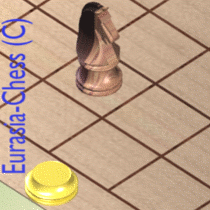 |
 |
 |
 |
- ~ -
All pieces are bicolor, enabling the
change of owner when captured, then dropped again on chessboard, thus
allowing to differentiate easily opponent's
pieces from yours.
Then, each player see himself black, and white for the opponnent. The real color of a camp (who start first?) is the color of its King cross.
Then, each player see himself black, and white for the opponnent. The real color of a camp (who start first?) is the color of its King cross.
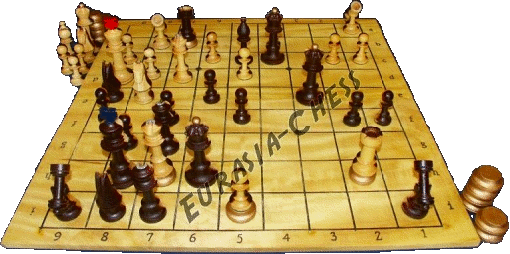 |
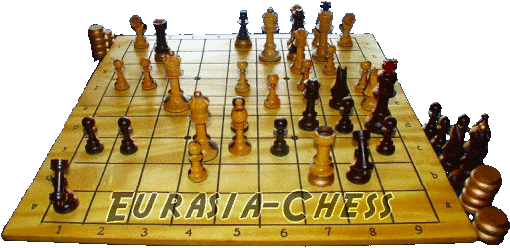 |
- ~ -
You'll find more info on http://www.eurasia-chess.com
 This 'user submitted' page is a collaboration between the posting user and the Chess Variant Pages. Registered contributors to the Chess Variant Pages have the ability to post their own works, subject to review and editing by the Chess Variant Pages Editorial Staff.
This 'user submitted' page is a collaboration between the posting user and the Chess Variant Pages. Registered contributors to the Chess Variant Pages have the ability to post their own works, subject to review and editing by the Chess Variant Pages Editorial Staff.
By Emmanuel Baud.
Web page created: 2008-06-18. Web page last updated: 2008-06-18
